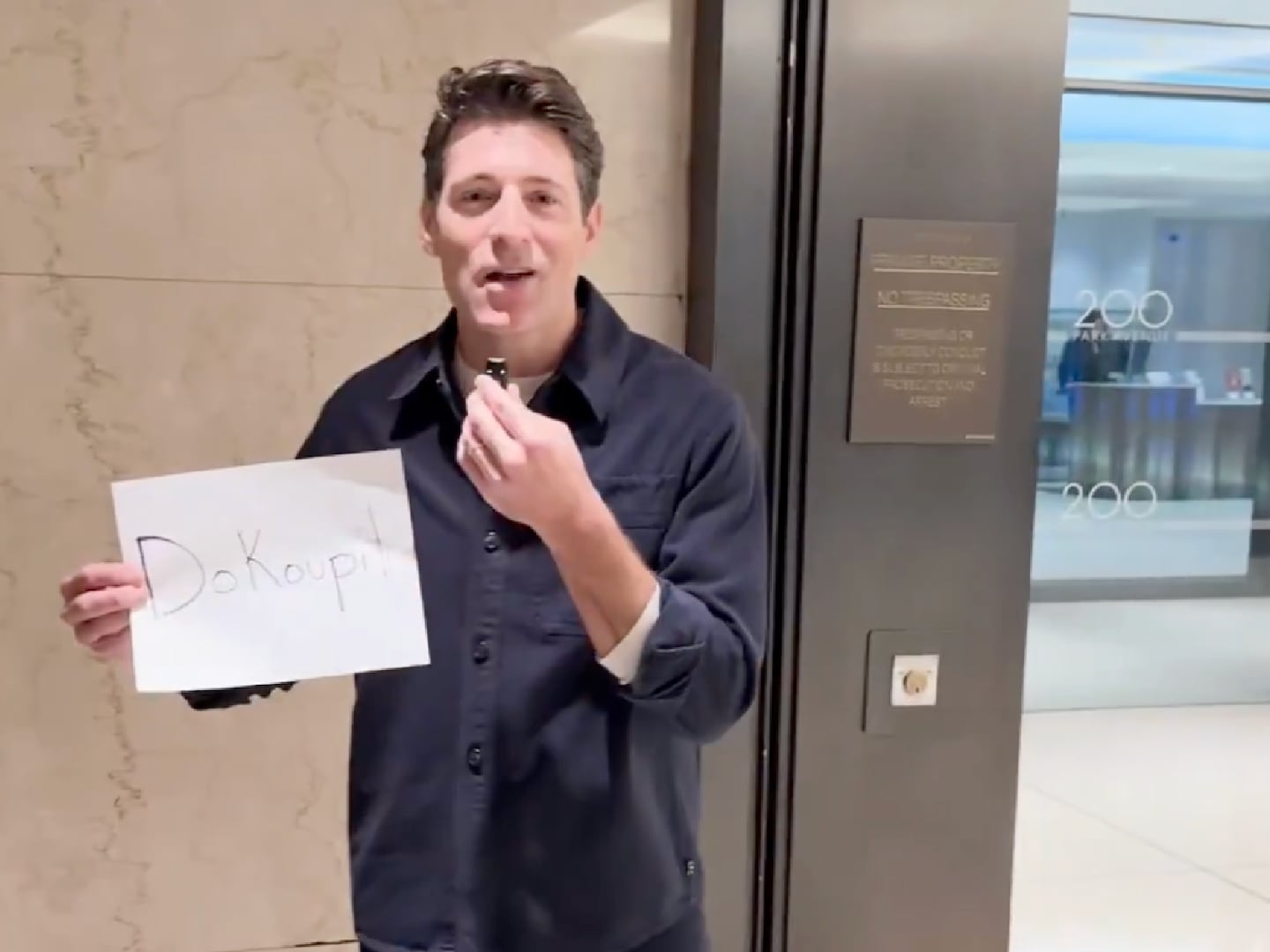—and features a feisty David Carr. Nicole LaPorte reports from Sundance.
In 1969, Gay Talese’s The Kingdom and the Power was published, which immortalized The New York Times as an imperial institution whose mission went far beyond the mere reporting of facts. The paper was, Talese wrote, “necessary proof” of the world’s existence.

Now, nearly a half-century later, comes Andrew Rossi’s documentary Page One: A Year Inside The New York Times, which finds the Gray Lady in a far more shaky state. The film, which premiered at the Sundance Film Festival on Sunday evening, is set against the backdrop of one of the most tumultuous years in print media—one in which lay-offs, bankruptcies, and closures were a daily reality for newspapers across the country, and which not even the Teflon Times was immune to.
At one point in the film, New York Times Executive Editor Bill Keller remarks, on a day when 100 Times staffers are given pink slips: “I feel like we should be wearing bloody butcher smocks around the newsroom.”
Rossi’s film raises questions about the simultaneous crippling and dynamic state of journalism today—is WikiLeaks founder Julian Assange a reporter? Is Twitter a valid news source?—but it is ultimately a love letter to the Times, and to the kind of old-school journalism where facts are diligently checked, sources are given a chance to respond, and a level-headed sense of reason prevails over flashy, traffic-driving headlines.
At the heart of the story is Times media columnist David Carr, whom Rossi rightfully recognizes as the humanizing way into his tale. (In fact, the project was initially supposed to be just about Carr, but when Carr felt he couldn’t do his job while having a cameraman trailing him at all times, he suggested that Rossi paint a broader picture of the paper.) A former crack addict and memoirist, Carr could at times be mistaken for a tramp and stands out like a sore but beloved thumb amongst the buttoned-down, gravelly-voiced ranks of Timesmen (they are almost exclusively men) presented in the film.
But for all of his outward idiosyncrasies, Carr is a soldier mired in devoted and loyal service to the Times, making him all the more crucial to Rossi’s tale, which trades on a heartfelt nostalgia for the valor of print.
When one of Vice Magazine’s young Gonzo executives tells Carr that Vice has been reporting on the lack of toilets in Liberia (resulting in humans defecating on the beach), but the Times wants to write about “surfing,” Carr shoots back: “Just because you put on a fucking safari hat and looked at poop doesn’t give you the right” to attack the paper of record.
It is still not entirely clear why the Times, a paper which has never felt the need to bow down or explain itself, allowed Rossi to infiltrate its inner sanctum.
Later in the interview, Carr blasts: “I don’t do corporate portraiture. What the fuck is going on with your partnership with CNN?”
“My daughter, when she saw (the film), she said, ‘You look like a thug,’” Carr told The Daily Beast at a dinner on Main Street following the premiere.
Leaning back in his chair, a striped woolen scarf thrown cavalierly around his neck, Carr frowned. “I don’t like how mean I am in the movie.”
The one “mean” scene he says he doesn’t regret was when he does a masterful takedown of Newser.com founder Michael Wolff (leaving the normally unflappable columnist speechless), during a panel discussion about the media.
“That, I like,” Carr said.
Asked about his folk hero role in the film, Carr said, “I don’t see anything heroic about what I do. I’ll give you an example. I covered Katrina, right? I was sent there between the architecture critic and the gossip person, that’s how mission-critical I was.
“And yet while I was down there, I saw Pulitzer-Prize-winning photographers pulling along boats through mud. You know, they’re colleagues. What they do is heroic. What I do is sit at a desk and type.”
Perhaps, but one of the most intriguing and dramatic threads in Rossi’s film is Carr’s investigative coverage of the corruption at the Tribune Company, a story that led to Tribune Chief Executive Randy Michaels stepping down.
It is still not entirely clear why the Times, a paper which has never felt the need to bow down or explain itself, allowed Rossi to infiltrate its inner sanctum, but there may be a combination of factors at work. Since the disgraced fall of former Times Executive Editor Howell Raines, who stepped down in the wake of the Jayson Blair scandal, the paper has been on a dogged mission to establish more transparency. How better to do this than to let cameras start rolling? At the same time, as the Times struggles to maintain its stronghold amidst the 24/7 clutter of websites, blogs, and Twitter, an entertainment product that pushes the brand is not the worst thing in the world.
Rossi captures this new-old-media struggle in his footage, most notably through Times TV reporter Brian Stelter, a former blogger who was hired when he was 21 (he’s now 25), and who is shown fuming over the fact that not all of his colleagues have Twitter accounts. Stelter laments that some of his peers “discover” stories that he’s read about hours ago on the social networking site.
But ultimately, the Times is depicted as an adaptive animal, willing to forge ahead and embrace the new and unknown. A Macy’s Parade-like celebration accompanies the release of the paper’s iPad app. The forthcoming paywall is being hailed as a very big, if not the primary, answer to bleeding costs. And the collaboration with WikiLeaks, in which the Times, along with Der Spiegel and The Guardian, published reports based on WikiLeaks documents on the Afghan war, is touted as the way of the future.
The Times is still peering at a very wrought, uncertain horizon. As Keller says, describing how things have changed since Daniel Ellsberg supplied the Times with the Pentagon Papers in the early 1970s: “The difference is, WikiLeaks doesn’t need us. Daniel Ellsberg did.”
Nicole LaPorte is the senior West Coast reporter for The Daily Beast and the author of The Men Who Would Be King: An Almost Epic Tale of Moguls, Movies, and a Company Called DreamWorks.






